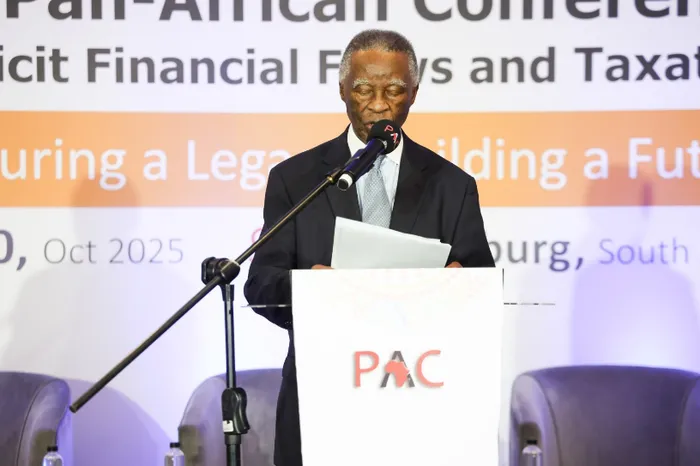
Former President Thabo Mbeki speaking at the 13th Pan-African Conference on Illicit Financial Flows and Taxation, held in Sandton. South Africa must introduce explicit legislation criminalising falsified trade practices to combat the massive outflow of resources through illicit financial flows, experts urged at a recent conference in Sandton.
Image: Supplied.
There is a growing and urgent call for South Africa to introduce legislation that explicitly criminalises falsified trade practices, according to Raymond Baker, a member of the High-Level Panel on IFFs (Illicit Financial Flows).
He says this move, which experts argue could significantly curtail illicit financial flows and restore integrity to cross-border commerce. The proposal, which advocates for a phased implementation beginning with the mining sector and expanding to large corporations, is rooted in decades of global research and policy advocacy.
Speaking at a press briefing during the 13th Pan-African Conference on Illicit Financial Flows and Taxation (PAC), held recently in Sandton, Barker, a seasoned expert in international trade and financial transparency, says: “Something utterly fundamental has happened in business and corporate operations over the last 50, 60, 70 years. Value and price have become two entirely different concepts. Value is what something is really worth. Price is a fiction you put on the invoice for the purpose of moving money across borders".
Drawing on his experience in over 100 countries, Baker asserts, “I now have realised that I have never known a multinational, multi-billion dollar, multi-product corporation that did not use falsified trade in some part of its operations," he says.
The manipulation of pricing mechanisms to avoid tax obligations, customs duties, and other forms of government revenue is not merely unethical; it is illegal. Baker calls for a clear legislative framework to distinguish between illicit and illegal conduct. “It’s time to clarify that trade, falsified trade, is illegal. It’s time for nations to write laws that say, in the business of import and export of goods or services or intangibles, to price a transaction in such a way as to intentionally avoid income taxes or excise taxes or customs duties or any other form of government revenue is illegal.”
He further proposes that corporate accountability be embedded in financial reporting. “Quote the law and sign that you have abided by the law, that will get rid of the majority of falsified trade.” Baker believes South Africa is well-positioned to lead this reform. “Something like that can be phased into existence in South Africa. For example, you could start with mining companies. Then you could go to larger corporations that have a level of 50 million or $100 million a year in revenue. And then you could go to all businesses.”
The legislative drafting, he insists, is not complex. “We have written such legislation as that. It’s time to make it against the law… require a signature on it where the individual who is head of that business confirms that he has complied, his company has complied with that law.”
Irene Ovonji-Odida, a member of the High-Level Panel on IFFs, is another prominent voice in the discourse, underscoring the systemic nature of the problem and the resistance to reform. “Because those who benefit… are the multinationals themselves, the countries they come from, which are mostly in the Global North, Europe, the USA, and so on.” She advocates for continued public engagement and vigilance. “There has been progress… and in terms of the way forward, I think continuing to have awareness and mobilisation is one of the things we need to do.”
The 13th Pan-African Conference on Illicit Financial Flows and Taxation (PAC), held recently in Sandton, provided a platform to reflect on a decade of advocacy and policy development. Former President Thabo Mbeki, delivering the keynote address, remarked: “The struggle against illicit financial flows and for tax justice is ultimately a political one. It is about sovereignty. It is about whether Africa’s wealth will continue to enrich others while our people remain in poverty, or whether we will finally harness these resources for our own development.”
Mbeki revisited the foundational purpose of the High-Level Panel (HLP), which in 2015 sought to expose the vast and often concealed outflows of African wealth. “We sought to make visible what had for too long been hidden: the massive haemorrhaging of Africa’s resources through illicit financial flows.” He emphasised that these flows are not abstract; they directly undermine Africa’s ability to fund development, deliver essential services, and build sustainable infrastructure.
Despite coordinated pushback from certain sectors, particularly around the classification of aggressive tax planning as illicit, the HLP succeeded in elevating the issue to the global stage, he says. “Keeping in mind the staggering numbers of outflows based on a lack of legal instruments, regulations, and capacity, the HLP played a critical role,” according to Mbeki.
He says over the past decade, the term “illicit financial flows” has gained traction among policymakers across the continent and globally. African institutions, including the African Union and the United Nations Economic Commission for Africa, have adopted the HLP’s recommendations. Technical bodies such as the African Tax Administration Forum (ATAF) and civil society organisations like Tax Justice Network Africa have sustained the momentum through rigorous advocacy and reform.
Patrick Ndzana Olomo, director of economic development, integration, and trade at the African Union Commission, says there is a transformative shift underway, an inclusive process that is bringing all stakeholders together in the fight against illicit financial flows.
"If we want to finance our own development, we must combat IFFs across the continent and mobilise our domestic resources. Africa has the resources; what we need now is the political will".
Concrete measures, such as beneficial ownership registers, automatic exchange of information, and enhanced transfer pricing capabilities, have strengthened the capacity of tax authorities to detect and deter abuse, Mbeki says. However, he cautioned that the challenge remains formidable. “We have not yet succeeded in stopping the outflows".
PERSONAL FINANCE